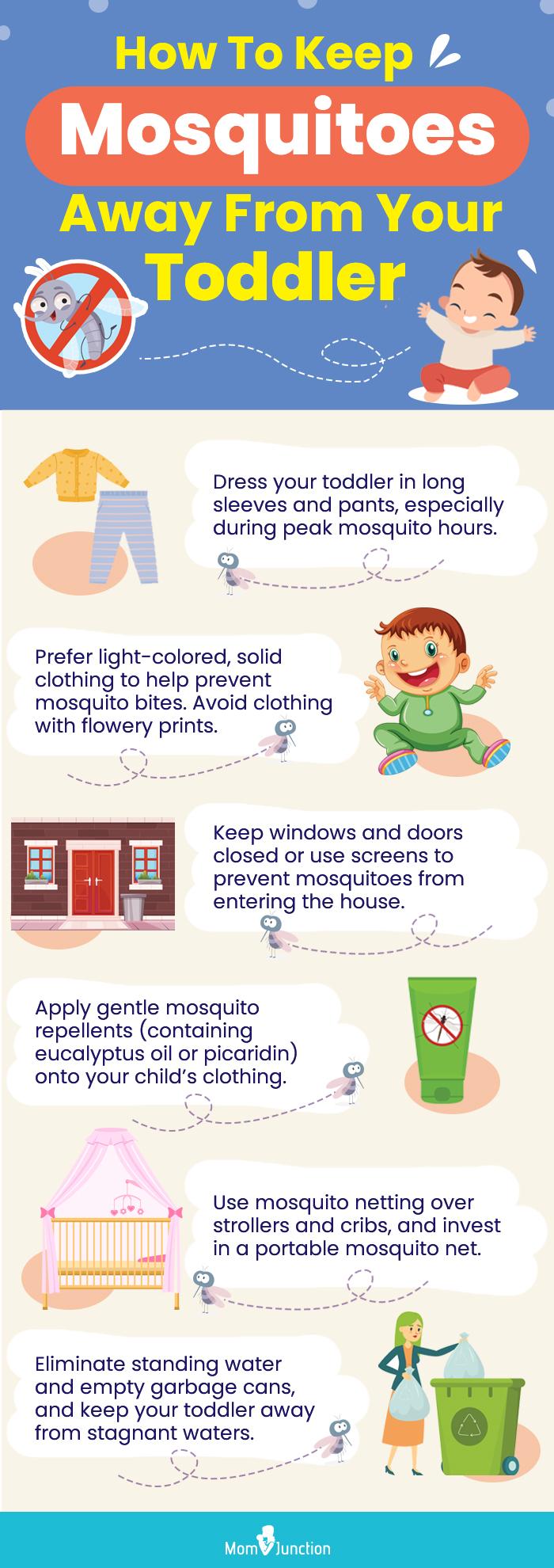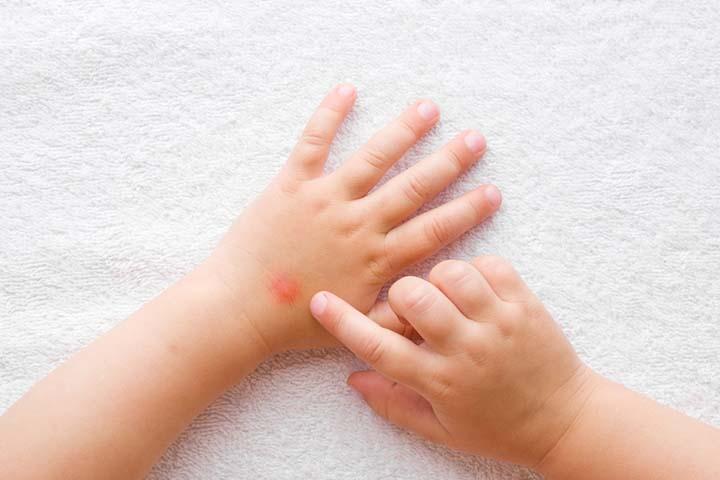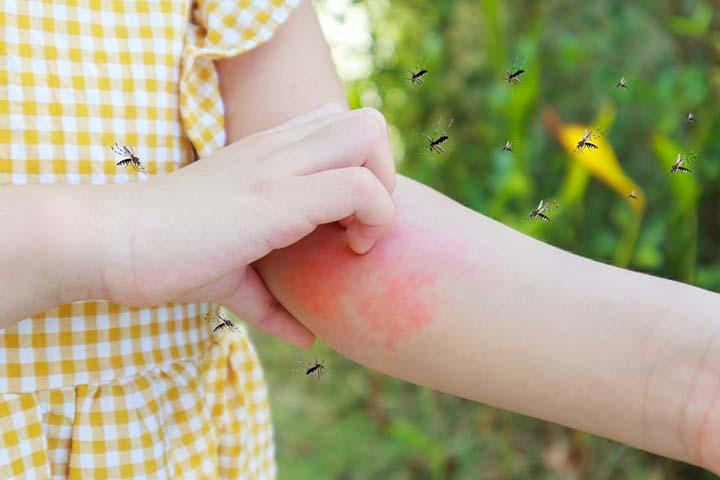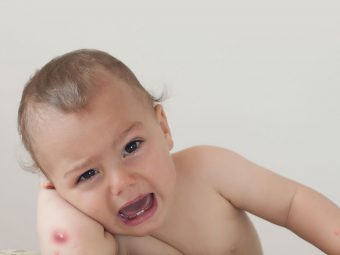
Image: Shutterstock
Mosquito bites in toddlers are common, and the itching annoyance these bites cause can irritate your toddler significantly. These bites may sometimes cause severe infections, such as malaria, dengue feveriXA mosquito-borne viral disease that causes a high fever and acute pain in the joints. , and West Nile EncephalitisiXAn infectious disease characterized by brain inflammation caused by the West Nile Virus. (1).
Additionally, scratching the irritating bites might result in boils, scarring, and scabbingiXThe dried crusty surface of a healing skin wound. . Therefore, prevention is the best approach, and you must take precautions to keep your toddler safe from mosquito bites.
This post explains all you need to know about mosquito bites, including recognizing them in toddlers and steps to protect them.
9 Ways To Protect Your Toddler From Mosquito Bites
You need to protect your toddler from mosquito bites. Here is what you can do (2) (3):
1. Use protective clothing that covers their arms and legs. Wearing socks is also a good idea to protect them from the bites.
2. Make your toddler wear light colored clothes and avoid flowery prints to keep away the mosquitoes.
Image: IStock
3. Rather than applying insect repellent on their body directly, you can apply it on the clothes and rub gently. The repellents you use must contain eucalyptus oil, picaridin, or geraniol. It must not come in contact with their hands and eyes.
4. You must never rub DEET products on the clothes of your toddler. The chemicals can cause potential harm to their skin.
5. Using a mosquito net at home is a good practice that you should follow. You can keep one handy in your car and carry it wherever you go.
6. Keep your toddler away from areas that have too many mosquitoes. Stagnant water and woody regions are highly inhabited by these pesky insects. Keep your toddler away from motionless water.
7. You must look out for empty garbage cans, unused toys or portable pool for your toddler that are also suitable breeding grounds.
8. If you have broken window seals, repair them. Keep the doors and windows closed if you face the problem of mosquitoes where you live. Use a fan or an air conditioner instead.
9. You must be particularly vigilant with your preventive techniques during dusk when mosquitoes are most active.
 Quick tip
Quick tip6 Effective Tips To Treat Mosquito Bites In Toddlers
Toddlers usually become an easy target for mosquitoes to bite. Here is what you can do while treating mosquito bites in toddlers (4) (5).
1. If you find your toddler scratching the affected area, apply ice to prevent swelling and itchiness.
Image: Shutterstock
2. You can also apply a roll-on deodorant containing aluminum chloride.
3. To treat the bite, you may also apply calamineiXAn OTC topical ointment used for relieving itching, pain, and skin irritation. lotion.
4. Continuous scratching may cause fingernails to break into the skin and cause growth of bacteria. So ask your toddler not to scratch it.
5. In case you find any signs of infection like pus, redness and swelling, call the doctor.
 Experts say
Experts saySymptoms Of Allergies From Mosquito Bites
Some of the common symptoms of allergies that you should look for are as follows (5) (6):
- Anaphylaxis (rare)iXAn extreme reaction to an allergen causing breathing difficulties and loss of consciousness.
- Large hivesiXSkin rash characterized by itchiness, commonly caused by allergenic foods or medications.
- Breathing trouble
- Blisters
- Difficulty swallowing
You should immediately see a doctor as these symptoms can be life threatening. Apart from being concerned about allergies, you must also consider the dangerous diseases transmitted through mosquito bites.
 Be watchful
Be watchfulWhen To Be Extra Alert For Toddler Mosquito Bites?
In the following cases, you must take your toddler to a doctor at the earliest (7):
- If you find reactions occurring in different body parts and/or he complains of difficulty in breathing.
- In case itchiness or swelling gets worse.
Image: Shutterstock
- If your toddler complains of pain and redness in the affected area and it does not subside even after 48 hours.
- If they talk or act in a confused manner.
- If you see pus draining at the site of the bite.
It is not possible to completely avoid mosquito bites in toddlers as they love being outdoors. However, following certain crucial and simple preventive measures could help keep your toddler safe from the after-effects of being bitten by a mosquito. Be mindful of the locality your toddler plays to keep them less prone to such bites and follow proper hygiene in and around your vicinity to keep mosquitoes at bay. You may apply ice or lotion to soothe a mosquito bite in your toddler and prevent them from scratching excessively. Seek medical care if the bite does not resolve in a couple of days or appears to have become infected.
Frequently Asked Questions
1. What do mosquito bites look like in toddlers?
Red bumps with itchy skin may indicate mosquito bites in toddlers. Some toddlers may experience swelling around the bite area, especially on the face or near the eye (5). Sometimes, it can look like hives on the skin.
2. How long do mosquito bites last on toddlers?
Skin itchiness and redness due to mosquito bites can last for three to four days in toddlers. Swelling around the eye or face may last for a week. Although a mosquito bite on the upper face may cause severe swelling lasting a few days, it won’t affect vision or do any harm (8).
3. Why are my toddlers’ mosquito bites so big?
Children are highly sensitive to mosquito bites and can develop severe reactions causing noticeable redness and swelling around the mosquito bite. This type of reaction in children is known as the skeeter syndrome. In comparison, adults may not develop large areas of redness or swelling since they become desensitized to mosquito bites (9).
4. Can a child get sick from too many mosquito bites?
It is possible for a child to get sick from mosquito bites, but this is usually due to the transmission of a virus or other pathogen, such as malaria, dengue, and zika virus, through the mosquito’s bite (1).
It is not possible to completely avoid mosquito bites in toddlers as they love being outdoors. However, following certain crucial and simple preventive measures could help keep your toddler safe from the after-effects of being bitten by a mosquito. Be mindful of the locality your toddler plays to keep them less prone to such bites and follow proper hygiene in and around your vicinity to keep mosquitoes at bay. You may apply ice or lotion to soothe a mosquito bite in your toddler and prevent them from scratching excessively. Seek medical care if the bite does not resolve in a couple of days or appears to have become infected.
Infographic: Ways To Protect Your Toddler From Mosquito Bites
Mosquitoes can vex adults and children alike, but they can be dangerous for toddlers, who are more vulnerable to mosquito-borne diseases. It is, therefore, vital to take steps to protect your toddler from mosquitoes. This infographic can be a quick and helpful guide to help protect your toddler from mosquitoes. Read on! Illustration: Momjunction Design Team
Get high-quality PDF version by clicking below.
Download Infographic
Key Pointers
- Use protective clothing, mosquito nets and avoid flowery prints to protect toddlers from mosquito bites.
- Apply ice, roll-on deodorant, or calamine lotion to treat mosquito bites in toddlers and discourage scratching.
- Watch out for symptoms of allergies from mosquito bites, including anaphylaxis, large hives, breathing difficulties, blisters, and difficulty swallowing.
References:
- Vector-borne diseases.
https://www.who.int/news-room/fact-sheets/detail/vector-borne-diseases - Prevent Mosquito Bites.
https://www.cdc.gov/mosquitoes/mosquito-bites/prevent-mosquito-bites.html - Mosquitoes – protect your home a checklist.
https://www.betterhealth.vic.gov.au/health/healthyliving/mosquitoes-protect-your-home-checklist - Mosquito Bite Symptoms and Treatment.
https://www.cdc.gov/mosquitoes/mosquito-bites/symptoms.html - Mosquito bite.
https://www.childrenscolorado.org/conditions-and-advice/conditions-and-symptoms/symptoms/mosquito-bite/ - Mosquito bites.
https://medlineplus.gov/mosquitobites.html - Mosquito bite.
https://www.stlouischildrens.org/health-resources/symptom-checker/mosquito-bite - Mosquito Bite.
https://www.seattlechildrens.org/conditions/a-z/mosquito-bite/#:~:text=Most%20mosquito%20bites%20itch%20for - Mosquito Bites.
https://www.stclair.org/services/mayo-clinic-health-information/diseases-and-conditions/CON-20375295/ - What Happens When a Mosquito Bite Gets Infected?
https://health.clevelandclinic.org/what-happens-when-a-mosquito-bite-gets-infected-and-what-to-do/



















